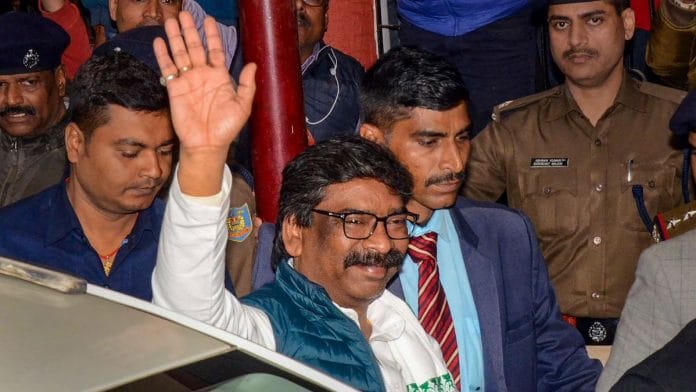New Delhi: Former Jharkhand chief minister Hemant Soren has to satisfy the Supreme Court on whether it could hear his petition challenging his arrest in a money laundering case when the trial court has taken cognizance of the Enforcement Directorate’s chargesheet.
A vacation bench led by Justice Dipankar Datta posed the query on this technical question Tuesday while hearing the JMM leader’s petition contesting his arrest. Soren has also sought interim bail to enable him participate in the election campaign for the ensuing Lok Sabha polls.
The former Jharkhand chief minister has claimed that the land grabbing allegation made by the ED is not a predicate offence or a standalone offence. Therefore, he contended, there is no basis for the ED to register a case.
The anti-money laundering agency, according to the law, can book a person only if there is an FIR registered against the person for an offence that is described as a scheduled or predicate offence in the PMLA.
The top court, however, asked Soren’s lawyer and senior advocate Kapil Sibal if the apex court could intervene at this stage since the subordinate court has already taken judicial note of the ED’s chargesheet. Filing of a chargesheet indicates that the case is ready for a trial.
“Here, cognizance has been taken, which means that there is a prima facie case. Here your case is that you could not have been arrested under Section 19 (of the Prevention of Money Laundering Act, PMLA) as there are no materials to believe that you are guilty. When the court has taken cognizance, that will impact your argument,” it said.
The verbal observations reiterated ED counsel and additional solicitor general S.V. Raju’s argument that there is judicial satisfaction regarding a prima facie case as the special court has taken cognizance of the agency’s complaint and issued the process to move ahead with trial.
Sibal, however, opposed this submission and also negated the court’s suggestion that subsequent judicial orders would give an “imprimatur to the arrest.” He gave reference to the apex court order that quashed the initial arrest of Newsclick owner Prabir Purkayastha and said if the arrest is declared as invalid then the subsequent remand orders will not validate it.
But the top court drew a distinction between Purkayastha and Soren’s case, saying there were “factual dissimilarities” in the two.
The trial court has taken cognisance in Soren’s case, it said. “When a judicial order taking cognizance is there, which has not been challenged, whether a writ court (SC) can look into it (question of arrest),” the bench asked Sibal.
The senior counsel said his argument was based on constitutional infirmity, as it is related to freedom. His argument, Sibal added, revolved around the fact that the ED lacked jurisdiction due to the absence of a predicate offence.
Therefore, Soren’s arrest did not abide by the procedure established by law and in such a scenario, took away his liberty entitled to him under Article 21. A writ court can interfere if there is violation of Article 19 of PMLA, Sibal submitted.
Sibal quoted the Vijay Madanlal Choudhary case that upheld the PMLA and contended that unless there is a scheduled offence, there cannot be proceeds of crime.
When the senior counsel asked for more time and remarked “the case is ex-facie cooked up,” the bench told him before concluding the hearing: “There is a good case on merits. But we have to look at it from a different perspective.”
Soren remains in judicial custody after his arrest on the evening of 31 January and is lodged in Ranchi’s Birsa Munda Central Jail.
(Edited by Tony Rai)






